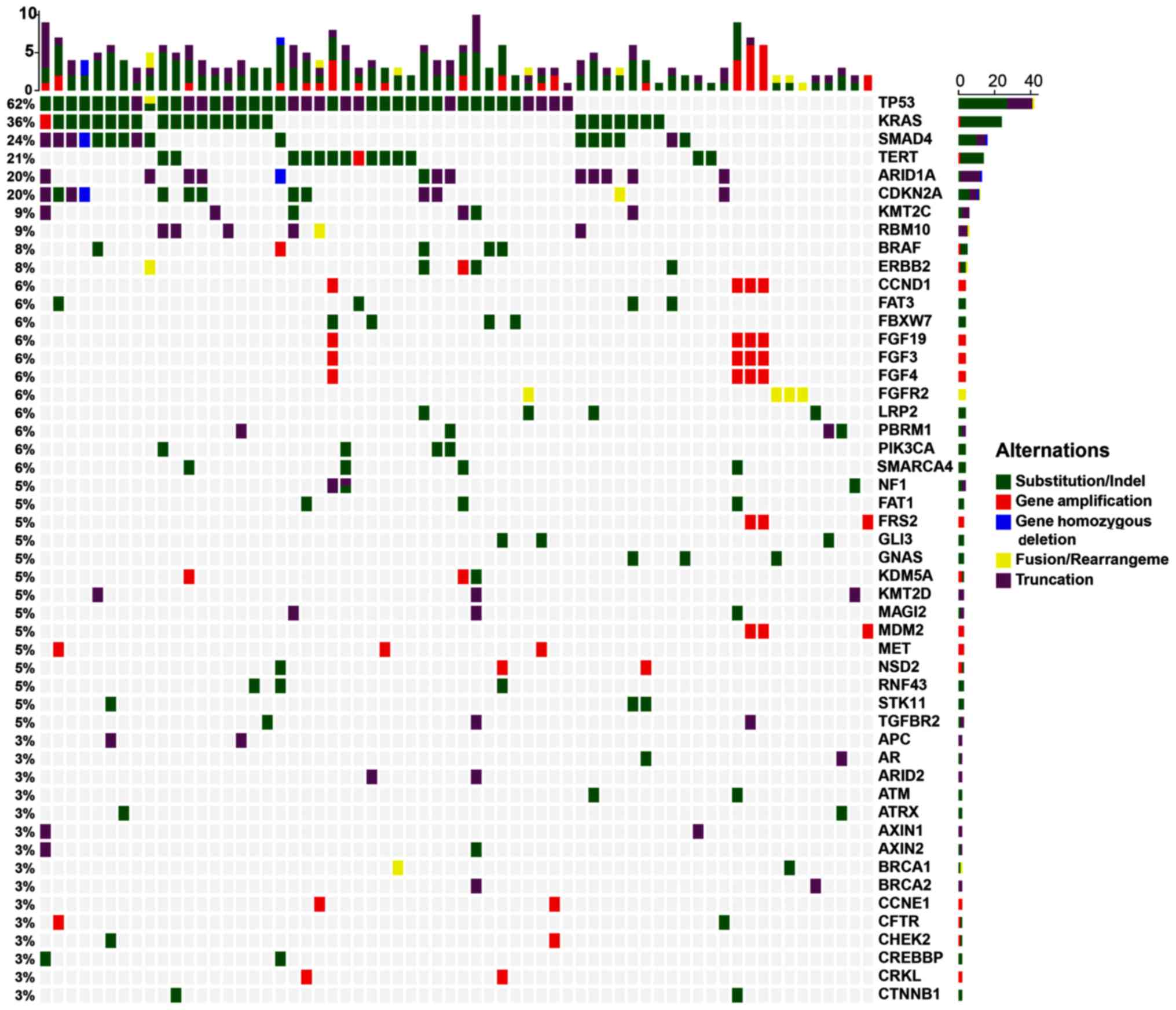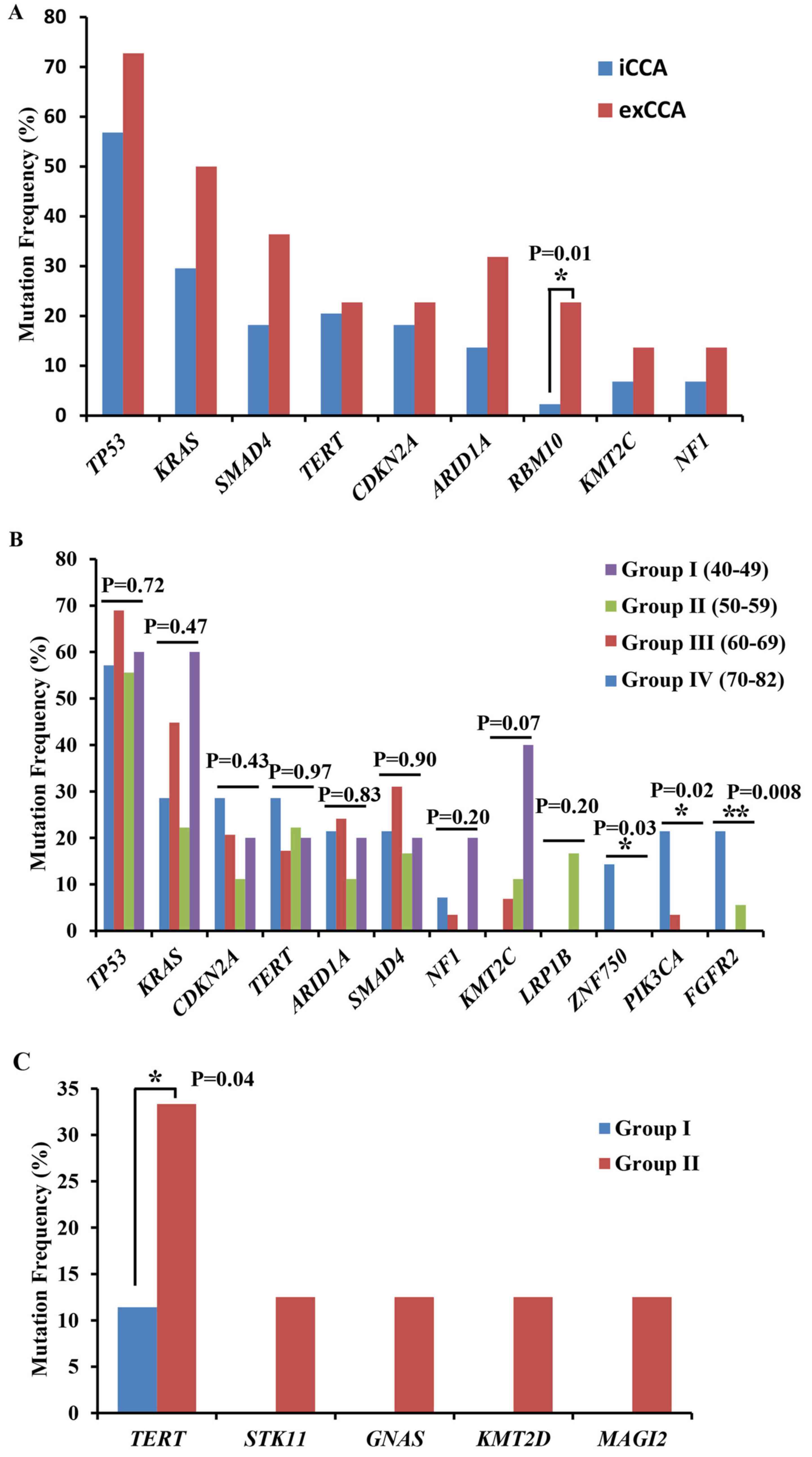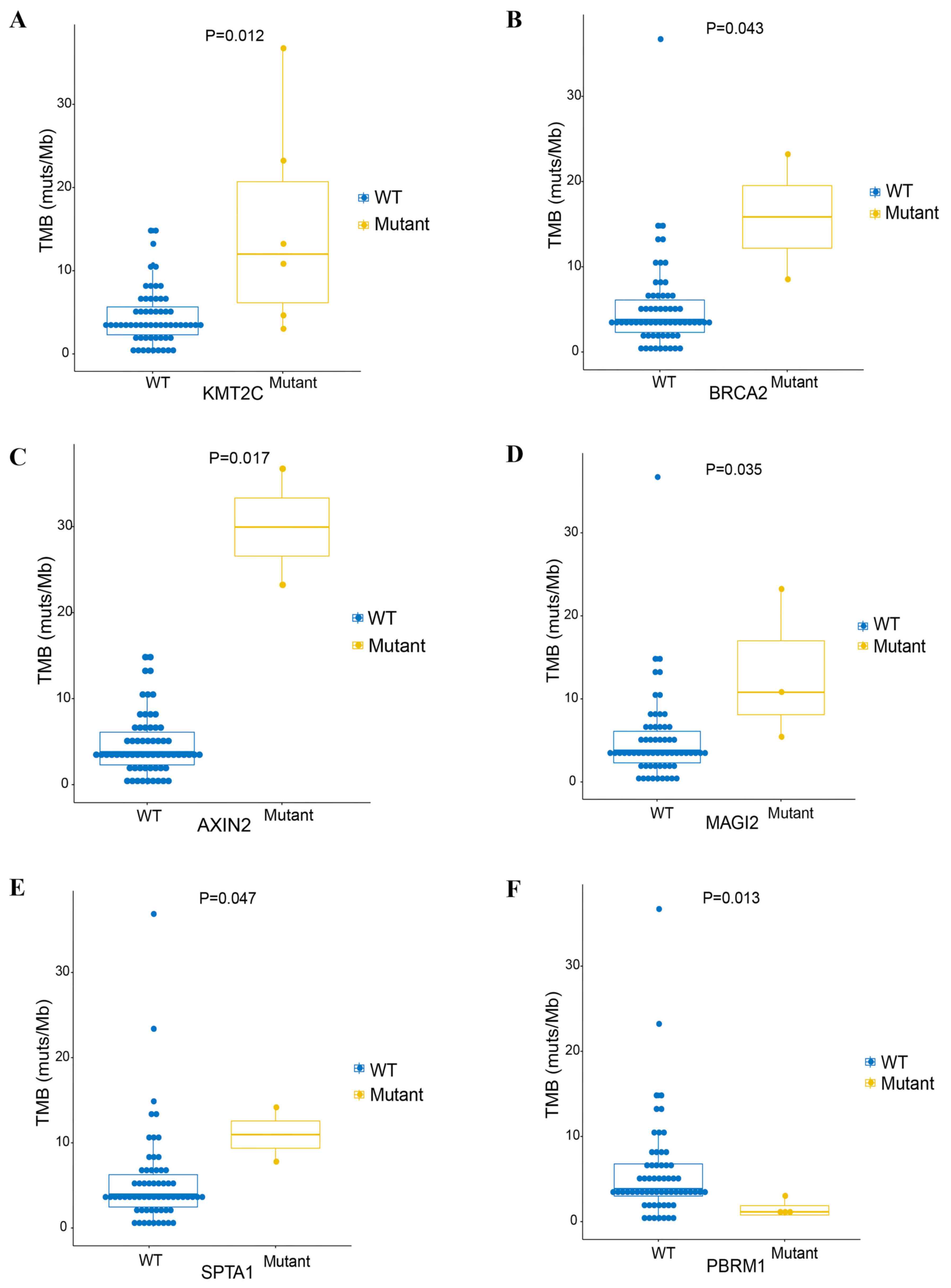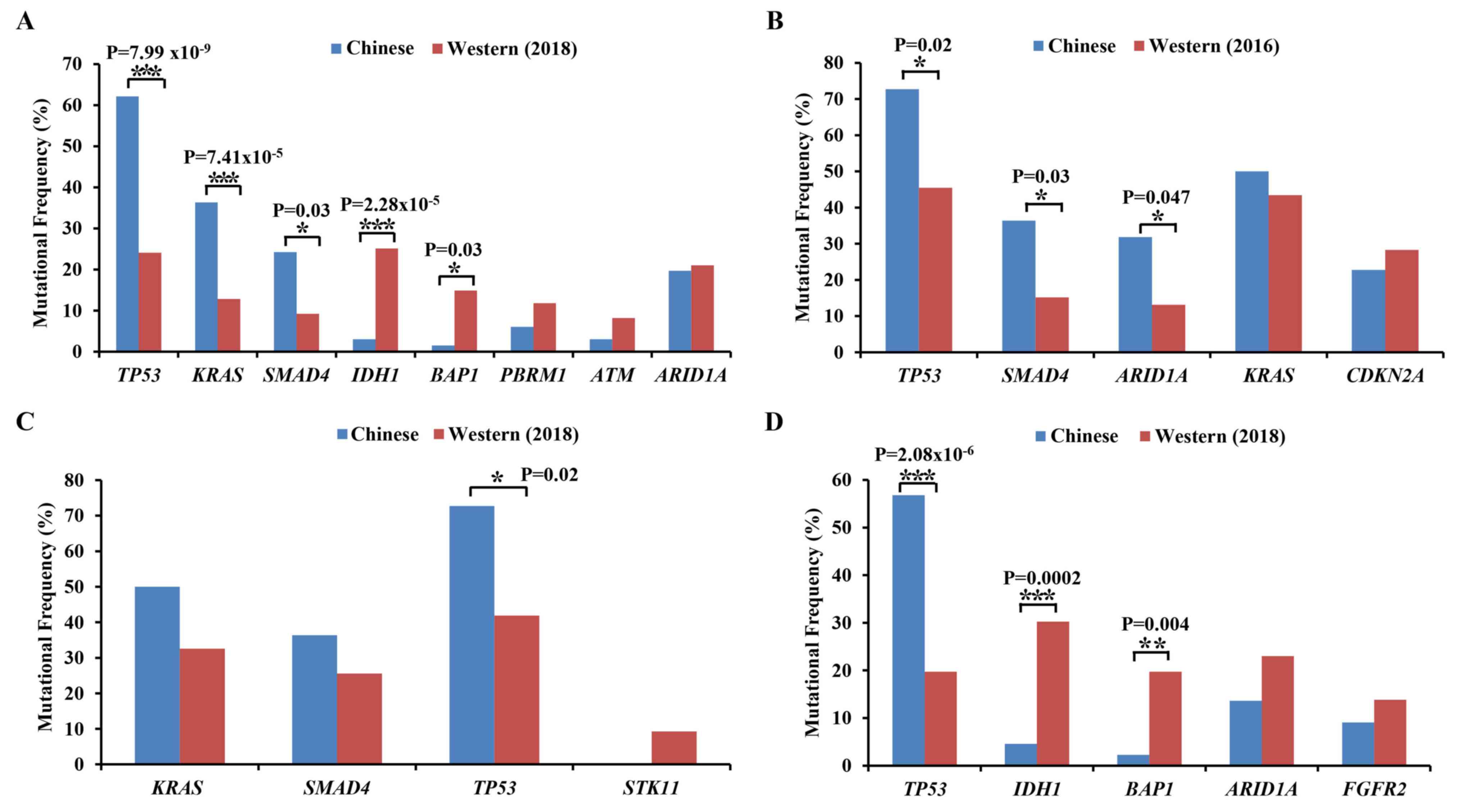|
1
|
Hoyos S, Navas MC, Restrepo JC and Botero
RC: Current controversies in cholangiocarcinoma. Biochim Biophys
Acta Mol Basis Dis. 1864:1461–1467. 2018. View Article : Google Scholar : PubMed/NCBI
|
|
2
|
Chong YS, Kim YK, Lee MW, Kim SH, Lee WJ,
Rhim HC and Lee SJ: Differentiating mass-forming intrahepatic
cholangiocarcinoma from atypical hepatocellular carcinoma using
gadoxetic acid-enhanced MRI. Clin Radiol. 67:766–773. 2012.
View Article : Google Scholar : PubMed/NCBI
|
|
3
|
Songserm N, Promthet S, Pientong C,
Ekalaksananan T, Chopjitt P and Wiangnon S: Gene-environment
interaction involved in cholangiocarcinoma in the Thai population:
Polymorphisms of DNA repair genes, smoking and use of alcohol. BMJ
Open. 4:e0054472014. View Article : Google Scholar : PubMed/NCBI
|
|
4
|
Cancer Genome Atlas Research Network, ;
Weinstein JN, Collisson EA, Mills GB, Shaw KR, Ozenberger BA,
Ellrott K, Shmulevich I, Sander C and Stuart JM: The cancer genome
atlas pan-cancer analysis project. Nat Genet. 45:1113–1120. 2013.
View Article : Google Scholar : PubMed/NCBI
|
|
5
|
Cancer Genome Atlas Research Network, ;
Kandoth C, Schultz N, Cherniack AD, Akbani R, Liu Y, Shen H,
Robertson AG, Pashtan I, Shen R, et al: Integrated genomic
characterization of endometrial carcinoma. Nature. 497:67–73. 2013.
View Article : Google Scholar : PubMed/NCBI
|
|
6
|
Nakamura H, Arai Y, Totoki Y, Shirota T,
Elzawahry A, Kato M, Hama N, Hosoda F, Urushidate T, Ohashi S, et
al: Genomic spectra of biliary tract cancer. Nat Genet.
47:1003–1010. 2015. View
Article : Google Scholar : PubMed/NCBI
|
|
7
|
Lin P, Zhong XZ, Wang XD, Li JJ, Zhao RQ,
He Y, Jiang YQ, Huang XW, Chen G, He Y and Yang H: Survival
analysis of genome-wide profiles coupled with connectivity map
database mining to identify potential therapeutic targets for
cholangiocarcinoma. Oncol Rep. 40:3189–3198. 2018.PubMed/NCBI
|
|
8
|
Mertens JC, Rizvi S and Gores GJ:
Targeting cholangiocarcinoma. Biochim Biophys Acta Mol Basis Dis.
1864:1454–1460. 2018. View Article : Google Scholar : PubMed/NCBI
|
|
9
|
Churi CR, Shroff R, Wang Y, Rashid A, Kang
HC, Weatherly J, Zuo M, Zinner R, Hong D, Meric-Bernstam F, et al:
Mutation profiling in cholangiocarcinoma: Prognostic and
therapeutic implications. PLoS One. 9:e1153832014. View Article : Google Scholar : PubMed/NCBI
|
|
10
|
Lowery MA, Ptashkin R, Jordan E, Berger
MF, Zehir A, Capanu M, Kemeny NE, O'Reilly EM, El-Dika I, Jarnagin
WR, et al: Comprehensive molecular profiling of intrahepatic and
extrahepatic cholangiocarcinomas: potential targets for
intervention. Clin Cancer Res. 24:4154–4161. 2018. View Article : Google Scholar : PubMed/NCBI
|
|
11
|
Zhao P, Chen H, Wen D, Mou S, Zhang F and
Zheng S: Personalized treatment based on mini patient-derived
xenografts and WES/RNA sequencing in a patient with metastatic
duodenal adenocarcinoma. Cancer Commun (Lond). 38:542018.
View Article : Google Scholar : PubMed/NCBI
|
|
12
|
Cibulskis K, Lawrence MS, Carter SL,
Sivachenko A, Jaffe D, Sougnez C, Gabriel S, Meyerson M, Lander ES
and Getz G: Sensitive detection of somatic point mutations in
impure and heterogeneous cancer samples. Nat Biotechnol.
31:213–219. 2013. View
Article : Google Scholar : PubMed/NCBI
|
|
13
|
Ye K, Schulz MH, Long Q, Apweiler R and
Ning Z: Pindel: A pattern growth approach to detect break points of
large deletions and medium sized insertions from paired-end short
reads. Bioinformatics. 25:2865–2871. 2009. View Article : Google Scholar : PubMed/NCBI
|
|
14
|
Cingolani P, Platts A, Wang le L, Coon M,
Nguyen T, Wang L, Land SJ, Lu X and Ruden DM: A program for
annotating and predicting the effects of single nucleotide
polymorphisms, SnpEff: SNPs in the genome of Drosophila
melanogaster strain w1118; iso-2; iso-3. Fly (Austin). 6:80–92.
2012. View Article : Google Scholar : PubMed/NCBI
|
|
15
|
Boeva V, Popova T, Bleakley K, Chiche P,
Cappo J, Schleiermacher G, Janoueix-Lerosey I, Delattre O and
Barillot E: Control-FREEC: A tool for assessing copy number and
allelic content using next-generation sequencing data.
Bioinformatics. 28:423–425. 2012. View Article : Google Scholar : PubMed/NCBI
|
|
16
|
Thorvaldsdóttir H, Robinson JT and Mesirov
JP: Integrative genomics viewer (IGV): High-performance genomics
data visualization and exploration. Brief Bioinform. 14:178–192.
2013. View Article : Google Scholar : PubMed/NCBI
|
|
17
|
Steuer CE and Ramalingam SS: Tumor
mutation burden: Leading immunotherapy to the era of precision
medicine? J Clin Oncol. 36:631–632. 2018. View Article : Google Scholar : PubMed/NCBI
|
|
18
|
Lee H, Wang K, Johnson A, Jones DM, Ali
SM, Elvin JA, Yelensky R, Lipson D, Miller VA, Stephens PJ, et al:
Comprehensive genomic profiling of extrahepatic cholangiocarcinoma
reveals a long tail of therapeutic targets. J Clin Pathol.
69:403–408. 2016. View Article : Google Scholar : PubMed/NCBI
|
|
19
|
Macias RIR, Banales JM, Sangro B, Muntané
J, Avila MA, Lozano E, Perugorria MJ, Padillo FJ, Bujanda L and
Marin JJG: The search for novel diagnostic and prognostic
biomarkers in cholangiocarcinoma. Biochim Biophys Acta Mol Basis
Dis. 1864:1468–1477. 2018. View Article : Google Scholar : PubMed/NCBI
|
|
20
|
Chan TA, Yarchoan M, Jaffee E, Swanton C,
Quezada SA, Stenzinger A and Peters S: Development of tumor
mutation burden as an immunotherapy biomarker: Utility for the
oncology clinic. Ann Oncol. 30:44–56. 2019. View Article : Google Scholar : PubMed/NCBI
|
|
21
|
Loree JM and Kopetz S: Recent developments
in the treatment of metastatic colorectal cancer. Ther Adv Med
Oncol. 9:551–564. 2017. View Article : Google Scholar : PubMed/NCBI
|
|
22
|
Zheng B, Qu Y, Wang J, Shi Y and Yan W:
Pathogenic and targetable genetic alterations in resected recurrent
undifferentiated pleomorphic sarcomas identified by targeted
next-generation sequencing. Cancer Genomics Proteomics. 16:221–228.
2019. View Article : Google Scholar : PubMed/NCBI
|
|
23
|
Hu J, Wang Y, Zhang Y, Yu Y, Chen H, Liu
K, Yao M, Wang K, Gu W and Shou T: Comprehensive genomic profiling
of small cell lung cancer in Chinese patients and the implications
for therapeutic potential. Cancer Med. 8:4338–4347. 2019.PubMed/NCBI
|
|
24
|
Fang W, Huang Y, Hong S, Zhang Z, Wang M,
Gan J, Wang W, Guo H, Wang K and Zhang L: EGFR exon 20 insertion
mutations and response to osimertinib in non-small-cell lung
cancer. BMC Cancer. 19:5952019. View Article : Google Scholar : PubMed/NCBI
|
|
25
|
Zheng B, Jeong S, Zhu Y, Chen L and Xia Q:
miRNA and lncRNA as biomarkers in cholangiocarcinoma (CCA).
Oncotarget. 8:100819–100830. 2017.PubMed/NCBI
|
|
26
|
Nakaoka T, Saito Y and Saito H: Aberrant
DNA methylation as a biomarker and a therapeutic target of
cholangiocarcinoma. Int J Mol Sci. 18(pii): E11112017. View Article : Google Scholar : PubMed/NCBI
|
|
27
|
Betesh L, Comunale MA, Wang M, Liang H,
Hafner J, Karabudak A, Giama NH, Moser CD, Miyoshi E, Roberts LR,
et al: Identification of fucosylated Fetuin-A as a potential
biomarker for cholangiocarcinoma. Proteomics Clin Appl. 11:2017.
View Article : Google Scholar : PubMed/NCBI
|
|
28
|
Ong CK, Subimerb C, Pairojkul C, Wongkham
S, Cutcutache I, Yu W, McPherson JR, Allen GE, Ng CC, Wong BH, et
al: Exome sequencing of liver fluke-associated cholangiocarcinoma.
Nat Genet. 44:690–693. 2012. View Article : Google Scholar : PubMed/NCBI
|
|
29
|
Jiao Y, Pawlik TM, Anders RA, Selaru FM,
Streppel MM, Lucas DJ, Niknafs N, Guthrie VB, Maitra A, Argani P,
et al: Exome sequencing identifies frequent inactivating mutations
in BAP1, ARID1A and PBRM1 in intrahepatic cholangiocarcinomas. Nat
Genet. 45:1470–1473. 2013. View Article : Google Scholar : PubMed/NCBI
|
|
30
|
Hill MA, Alexander WB, Guo B, Kato Y,
Patra K, O'Dell MR, McCall MN, Whitney-Miller CL, Bardeesy N and
Hezel AF: Kras and Tp53 mutations cause cholangiocyte- and
hepatocyte-derived cholangiocarcinoma. Cancer Res. 78:4445–4451.
2018. View Article : Google Scholar : PubMed/NCBI
|
|
31
|
Hedau S, Jain N, Husain SA, Mandal AK, Ray
G, Shahid M, Kant R, Gupta V, Shukla NK, Deo SS and Das BC: Novel
germline mutations in breast cancer susceptibility genes BRCA1,
BRCA2 and p53 gene in breast cancer patients from India. Breast
Cancer Res Treat. 88:177–186. 2004. View Article : Google Scholar : PubMed/NCBI
|
|
32
|
van Ginkel JH, de Leng WW, de Bree R, van
Es RJ and Willems SM: Targeted sequencing reveals TP53 as a
potential diagnostic biomarker in the post-treatment surveillance
of head and neck cancer. Oncotarget. 7:61575–61586. 2016.
View Article : Google Scholar : PubMed/NCBI
|
|
33
|
Kandioler D, Schoppmann SF, Zwrtek R,
Kappel S, Wolf B, Mittlböck M, Kührer I, Hejna M, Pluschnig U,
Ba-Ssalamah A, et al: The biomarker TP53 divides patients with
neoadjuvantly treated esophageal cancer into 2 subgroups with
markedly different outcomes. A p53 Research Group study. J Thorac
Cardiovasc Surg. 148:2280–2286. 2014. View Article : Google Scholar : PubMed/NCBI
|
|
34
|
Simbolo M, Vicentini C, Ruzzenente A,
Brunelli M, Conci S, Fassan M, Mafficini A, Rusev B, Corbo V,
Capelli P, et al: Genetic alterations analysis in prognostic
stratified groups identified TP53 and ARID1A as poor clinical
performance markers in intrahepatic cholangiocarcinoma. Sci Rep.
8:71192018. View Article : Google Scholar : PubMed/NCBI
|
|
35
|
Shtraizent N, Matsui H, Polotskaia A and
Bargonetti J: Hot spot mutation in TP53 (R248Q) causes oncogenic
gain-of-function phenotypes in a breast cancer cell line derived
from an African American patient. Int J Environ Res Public Health.
13:ijerph130100222015. View Article : Google Scholar : PubMed/NCBI
|
|
36
|
Yang K, Li Y, Lian G, Lin H, Shang C, Zeng
L, Chen S, Li J, Huang C, Huang K and Chen Y: KRAS promotes tumor
metastasis and chemoresistance by repressing RKIP via the MAPK-ERK
pathway in pancreatic cancer. Int J Cancer. 142:2323–2334. 2018.
View Article : Google Scholar : PubMed/NCBI
|
|
37
|
Nakano Y, Kitago M, Matsuda S, Nakamura Y,
Fujita Y, Imai S, Shinoda M, Yagi H, Abe Y, Hibi T, et al: KRAS
mutations in cell-free DNA from preoperative and postoperative sera
as a pancreatic cancer marker: A retrospective study. Br J Cancer.
118:662–669. 2018. View Article : Google Scholar : PubMed/NCBI
|
|
38
|
Addeo A, Torralvo J and Dietrich PY: 192P
KRAS as predictive biomarker of response to checkpoint inhibitors
in NSCLC. J Thorac Oncol. 13 (4 Suppl):S114–S115. 2018. View Article : Google Scholar
|
|
39
|
Petrelli F, Coinu A, Cabiddu M, Ghilardi M
and Barni S: KRAS as prognostic biomarker in metastatic colorectal
cancer patients treated with bevacizumab: A pooled analysis of 12
published trials. Med Oncol. 30:6502013. View Article : Google Scholar : PubMed/NCBI
|
|
40
|
Dong ZY, Zhong WZ, Zhang XC, Su J, Xie Z,
Liu SY, Tu HY, Chen HJ, Sun YL, Zhou Q, et al: Potential predictive
value of TP53 and KRAS mutation status for response to PD-1
blockade immunotherapy in lung adenocarcinoma. Clin Cancer Res.
23:3012–3024. 2017. View Article : Google Scholar : PubMed/NCBI
|
|
41
|
O'Dell MR, Huang JL, Whitney-Miller CL,
Deshpande V, Rothberg P, Grose V, Rossi RM, Zhu AX, Land H,
Bardeesy N and Hezel AF: Kras(G12D) and p53 mutation cause primary
intrahepatic cholangiocarcinoma. Cancer Res. 72:1557–1567. 2012.
View Article : Google Scholar : PubMed/NCBI
|
|
42
|
Ma ES, Wong CL, Law FB, Chan WK and Siu D:
Detection of KRAS mutations in colorectal cancer by high-resolution
melting analysis. J Clin Pathol. 62:886–891. 2009. View Article : Google Scholar : PubMed/NCBI
|
|
43
|
Thobe MN, Yan SB, Credille KM, Nasir A,
Baker JAR, Lajiness M, Brooks NA, Ballard DW, Farley DM, Peek VL,
et al: Abstract 2339: Prevalence of MET expression, activating
mutations of KRAS and IDH1/2, and ROS1 fusions in
cholangiocarcinoma patient tumor samples. Cancer Res.
73:23392013.
|
|
44
|
Jusakul A, Cutcutache I, Yong CH, Lim JQ,
Huang MN, Padmanabhan N, Nellore V, Kongpetch S, Ng AWT, Ng LM, et
al: Whole-genome and epigenomic landscapes of etiologically
distinct subtypes of cholangiocarcinoma. Cancer Discov.
7:1116–1135. 2017. View Article : Google Scholar : PubMed/NCBI
|
|
45
|
Ikenoue T, Terakado Y, Nakagawa H, Hikiba
Y, Fujii T, Matsubara D, Noguchi R, Zhu C, Yamamoto K, Kudo Y, et
al: A novel mouse model of intrahepatic cholangiocarcinoma induced
by liver-specific Kras activation and Pten deletion. Sci Rep.
6:238992016. View Article : Google Scholar : PubMed/NCBI
|
|
46
|
Foulkes WD, Flanders TY, Pollock PM and
Hayward NK: The CDKN2A (p16) gene and human cancer. Mol Med.
3:5–20. 1997. View Article : Google Scholar : PubMed/NCBI
|
|
47
|
Heidenreich B, Rachakonda PS, Hemminki K
and Kumar R: TERT promoter mutations in cancer development. Curr
Opin Genet Dev. 24:30–37. 2014. View Article : Google Scholar : PubMed/NCBI
|
|
48
|
Hernández J, Bechara E, Schlesinger D,
Delgado J, Serrano L and Valcárcel J: Tumor suppressor properties
of the splicing regulatory factor RBM10. RNA Biol. 13:466–472.
2016. View Article : Google Scholar : PubMed/NCBI
|
|
49
|
Bhagat V and Somasundar P: 16 Impact of
gender and race/ethnicity on hepatocellular carcinoma, intrahepatic
cholangiocarcinoma and extrahepatic cholangiocarcinoma.
Gastroenterology. 150:S52016. View Article : Google Scholar
|
|
50
|
Taber JM, Klein WM, Suls JM and Ferrer RA:
Lay awareness of the relationship between age and cancer risk. Ann
Behav Med. 51:214–225. 2016. View Article : Google Scholar
|
|
51
|
Lin JW, Li X, Qiu ML, Luo RG, Lin JB and
Liu B: PI3K overexpression and PIK3CA mutations are associated with
age, tumor staging, and other clinical characteristics in Chinese
patients with esophageal squamous cell carcinoma. Genet Test Mol
Biomarkers. 21:236–241. 2017. View Article : Google Scholar : PubMed/NCBI
|
|
52
|
Xu RF, Sun JP, Zhang SR, Zhu GS, Li LB,
Liao YL, Xie JM and Liao WJ: KRAS and PIK3CA but not BRAF genes are
frequently mutated in Chinese cholangiocarcinoma patients. Biomed
Pharmacother. 65:22–26. 2011. View Article : Google Scholar : PubMed/NCBI
|
|
53
|
Barnholtz-Sloan JS, Shetty PB, Guan X,
Nyante SJ, Luo J, Brennan DJ and Millikan RC: FGFR2 and other loci
identified in genome-wide association studies are associated with
breast cancer in African-American and younger women.
Carcinogenesis. 31:1417–1423. 2010. View Article : Google Scholar : PubMed/NCBI
|
|
54
|
Katoh M: Cancer genomics and genetics of
FGFR2 (Review). Int J Oncol. 33:233–237. 2008.PubMed/NCBI
|
|
55
|
Otsuka R, Akutsu Y, Sakata H, Hanari N,
Murakami K, Kano M, Toyozumi T, Takahashi M, Matsumoto Y, Sekino N,
et al: ZNF750 expression is a potential prognostic biomarker in
esophageal squamous cell carcinoma. Oncology. 94:142–148. 2018.
View Article : Google Scholar : PubMed/NCBI
|
|
56
|
Zheng F, Yuan X, Chen E, Ye Y, Li X and
Dai Y: Methylation of STK11 promoter is a risk factor for tumor
stage and survival in clear cell renal cell carcinoma. Oncol Lett.
14:3065–3070. 2017. View Article : Google Scholar : PubMed/NCBI
|
|
57
|
Ardeshir-Larijani F, Bhateja P, Lipka MB,
Sharma N, Fu P and Dowlati A: KMT2D mutation is associated with
poor prognosis in non-small-cell lung cancer. Clin Lung Cancer.
19:e489–e501. 2018. View Article : Google Scholar : PubMed/NCBI
|
|
58
|
Bahrami A, Lee S, Schaefer IM, Boland JM,
Patton KT, Pounds S and Fletcher CD: TERT promoter mutations and
prognosis in solitary fibrous tumor. Mod Pathol. 29:1511–1522.
2016. View Article : Google Scholar : PubMed/NCBI
|
|
59
|
Shen N, Lu Y, Wang X, Peng J, Zhu Y and
Cheng L: Association between rs2853669 in TERT gene and the risk
and prognosis of human cancer: A systematic review and
meta-analysis. Oncotarget. 8:50864–50872. 2017.PubMed/NCBI
|
|
60
|
Elston CW: The assessment of histological
differentiation in breast cancer. Aust N Z J Surg. 54:11–15. 1984.
View Article : Google Scholar : PubMed/NCBI
|
|
61
|
Padma R, Kalaivani A, Sundaresan S and
Sathish P: The relationship between histological differentiation
and disease recurrence of primary oral squamous cell carcinoma. J
Oral Maxillofac Pathol. 21:4612017. View Article : Google Scholar : PubMed/NCBI
|
|
62
|
Borger DR, Tanabe KK, Fan KC, Lopez HU,
Fantin VR, Straley KS, Schenkein DP, Hezel AF, Ancukiewicz M,
Liebman HM, et al: Frequent mutation of isocitrate dehydrogenase
(IDH)1 and IDH2 in cholangiocarcinoma identified through
broad-based tumor genotyping. Oncologist. 17:72–79. 2012.
View Article : Google Scholar : PubMed/NCBI
|
|
63
|
Zou S, Li J, Zhou H, Frech C, Jiang X, Chu
JS, Zhao X, Li Y, Li Q, Wang H, et al: Mutational landscape of
intrahepatic cholangiocarcinoma. Nat Commun. 5:56962014. View Article : Google Scholar : PubMed/NCBI
|
|
64
|
Riaz N, Havel JJ, Makarov V, Desrichard A,
Urba WJ, Sims JS, Hodi FS, Martín-Algarra S, Mandal R, Sharfman WH,
et al: Tumor and microenvironment evolution during immunotherapy
with nivolumab. Cell. 171:934–949.e16. 2017. View Article : Google Scholar : PubMed/NCBI
|
|
65
|
Yarchoan M, Hopkins A and Jaffee EM: Tumor
mutational burden and response rate to PD-1 inhibition. N Engl J
Med. 377:2500–2501. 2017. View Article : Google Scholar : PubMed/NCBI
|
|
66
|
Rizvi NA, Hellmann MD, Snyder A, Kvistborg
P, Makarov V, Havel JJ, Lee W, Yuan J, Wong P, Ho TS, et al: Cancer
immunology. Mutational landscape determines sensitivity to PD-1
blockade in non-small cell lung cancer. Science. 348:124–128. 2015.
View Article : Google Scholar : PubMed/NCBI
|
|
67
|
Goswami B, Mittal P and Gupta N:
Correlation of levels of IL-6 with tumor burden and receptor status
in patients of locally advanced carcinoma breast. Indian J Clin
Biochem. 28:90–94. 2013. View Article : Google Scholar : PubMed/NCBI
|
|
68
|
Frampton AE, Prado MM, Lopez-Jimenez E,
Fajardo-Puerta AB, Jawad ZAR, Lawton P, Giovannetti E, Habib NA,
Castellano L, Stebbing J, et al: Glypican-1 is enriched in
circulating-exosomes in pancreatic cancer and correlates with tumor
burden. Oncotarget. 9:19006–19013. 2018. View Article : Google Scholar : PubMed/NCBI
|
|
69
|
Yuza K, Nagahashi M, Watanabe S, Takabe K
and Wakai T: Hypermutation and microsatellite instability in
gastrointestinal cancers. Oncotarget. 8:112103–112115. 2017.
View Article : Google Scholar : PubMed/NCBI
|
|
70
|
Mou H, Yu L, Liao Q, Hou X, Wu Y, Cui Q,
Yan N, Ma R, Wang L, Yao M and Wang K: Successful response to the
combination of immunotherapy and chemotherapy in cholangiocarcinoma
with high tumour mutational burden and PD-L1 expression: A case
report. BMC Cancer. 18:11052018. View Article : Google Scholar : PubMed/NCBI
|
|
71
|
Goodman AM, Kato S, Bazhenova L, Patel SP,
Frampton GM, Miller V, Stephens PJ, Daniels GA and Kurzrock R:
Tumor mutational burden as an independent predictor of response to
immunotherapy in diverse cancers. Mol Cancer Ther. 16:2598–2608.
2017. View Article : Google Scholar : PubMed/NCBI
|
|
72
|
Zhang G, Liu T and Wang Z: Downregulation
of MAGI1 associates with poor prognosis of hepatocellular
carcinoma. J Invest Surg. 25:93–99. 2012. View Article : Google Scholar : PubMed/NCBI
|
|
73
|
Tseng RC, Lin RK, Wen CK, Tseng C, Hsu HS,
Hsu WH and Wang YC: Epigenetic silencing of AXIN2/betaTrCP and
deregulation of p53-mediated control lead to wild-type beta-catenin
nuclear accumulation in lung tumorigenesis. Oncogene. 27:4488–4496.
2008. View Article : Google Scholar : PubMed/NCBI
|
|
74
|
Cho SJ, Yoon C, Lee JH, Chang KK, Lin JX,
Kim YH, Kook MC, Aksoy BA, Park DJ, Ashktorab H, et al: KMT2C
mutations in diffuse-type gastric adenocarcinoma promote
epithelial-to-mesenchymal transition. Clin Cancer Res.
24:6556–6569. 2018. View Article : Google Scholar : PubMed/NCBI
|


















